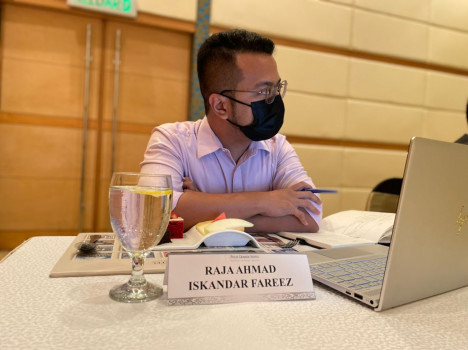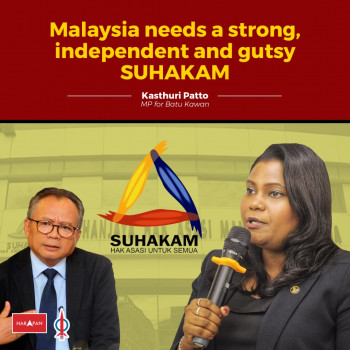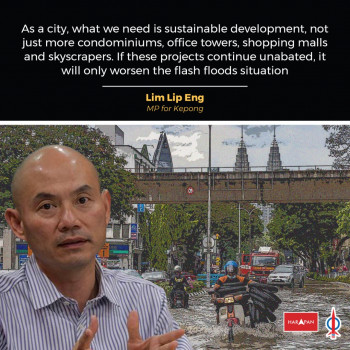by Tricia Yeoh
Yet another Malaysian incident has made it into international news.
The Wall Street Journal, amongst other newspapers since, has reported on Bank Islam’s suspension of Azrul Azwar Ahmad Tajudin after his analysis of a possible Opposition win at Federal Parliament was presented at a Regional Outlook Forum in Singapore last week.
Azrul’s presentation on Malaysia’s economic and political outlook of 2013 included a section on the domestic political landscape, which outlined three possible scenarios as a result of the upcoming 13th General Election.
The first, a scenario with moderate probability or best-case scenario, was a narrow win for Barisan Nasional; the second a scenario with high probability or base-case scenario of a narrow win for Pakatan Rakyat; and finally a third scenario with very low probability or worst-case scenario of a big loss for Barisan Nasional.
Since then, a group of civil society organisations and individuals have issued a statement in support of Azrul, and in protest of what is seen to be Bank Islam’s unprofessional and unjust act of suspension.
In its statement (for full disclosure, I was also a signatory to this statement), it was argued that financial markets would require free access to information, and that elections analyses are of “paramount importance for the markets and the country”. Finally, that in so doing, Bank Islam showed its reporting policy of being favourable only to Barisan-friendly news.
This issue is something that all of us in professional jobs and relationships have to deal with on a regular basis.
It brings up several points in question, namely whether there ought to be a distinction between one’s personal versus professional opinions on a certain – in this case, political – matter.
For instance, one blogger wrote stating that Azrul should have known that working in such a corporation meant requiring him to behave in a manner expected of him.
Bank Islam, a bank close to the Barisan government, would naturally have received pressure after what was perceived to be a Pakatan-friendly prediction.
Other bloggers have also insinuated that because he is a member of Parti Keadilan Rakyat, and had exchanged e-mails with members of the political party, this meant he compromised on his professionalism.
A second point is whether or not it is within the job function and ability of an economist to make elections predictions, the way a political scientist would have more likely been able to.
For what it’s worth, Azrul did precede his analyses with the acknowledgement that he was no political analyst, and that the prediction was based on a set of factors including: analysis of voter profile, past voting trends in the 2008 election and consequent 16 by-elections, Sarawak state elections, ground visits, voting patterns with identified election issues, as well as assumed conditions under which these would take place.
Just how much of a gap should exist between our personal and professional lives? One imagines the number of Malaysians in either the private or public sector who may, perhaps, have attended last Saturday’s successful Himpunan Kebangkitan Rakyat (People’s Uprising Rally) in Stadium Merdeka in support of the opposition Pakatan Rakyat – but yet keep it quiet when entering their office premises on the following Monday morning, for fear that their personal sentiments would have an adverse effect on their job positions, contracting relationships with government, and so on.
Should they have to? Ought an employee to adhere strictly to the corporate code of conduct and set of beliefs of his or her employer at all times, or should independent thought be protected as the right to freedom of expression?
These answers will vary according to the specific employer in question.
However, a general principle would be for the employee to behave in a professional manner as far as the boundaries of the work required of him go.
In this particular situation, the question we may ask is whether as the chief economist of Bank Islam, it was considered fair and acceptable for him to have conducted political analyses for the purposes of determining Malaysia’s economic outlook for the year.
We know, for example, that political outcomes have a direct impact on the economy. A change in government would certainly affect markets, investor sentiment and institutional structures.
It is therefore safe to state that presenting his election outcome analyses was part and parcel of behaving in a professional manner.
There is a difference between expressing a theoretical analysis and a personal preference; in this case, it was the former and not the latter.
Bank Islam does emerge from this looking the loser, and may have to conduct some public relations messaging to defend its actions.
By suspending Azrul, the message it sent was “we do not tolerate opinions that are favourable to any party other than the ruling government”.
Going forward, employers at all levels of companies would be forced to consider how to balance their employees’ needs with their personal sentiment; is there a “line” to maintain, and if so, what justifies this position?
Ultimately, what must be remembered is that individuals when undertaking their jobs based on their professional duties as required should not be persecuted for political reasons alone.
________________________________
* This article first appeared in the Selangor Times.



